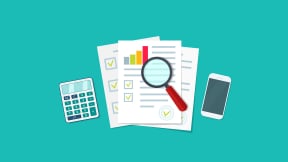Is it better to use a debit or credit card in college: pros and cons

College, for many students, can mean independence — in all forms. As a college student, you’re responsible for getting to class on time, staying on top of your studies, living independently, and likely keeping your finances in check.
Being financially independent, or on your way to financial independence, can come with challenges, including figuring out how to manage and spend money responsibly. As you set out to do that, you may wonder: is it better to use a debit or credit card as a college student?
The answer is that it’s essential to consider your financial goals, spending habits, and ability to manage credit responsibly to determine which option (or combination) is best for you and your financial situation.
Continue reading as we delve into some potential pros and cons of using a debit card versus a credit card in college.
Using a debit card in college
Debit cards are linked to a checking or savings account and can be used to make purchases, be it in-person or online. You can usually use your debit card to purchase textbooks, shop for groceries, book travel, and more. Debit cards can also be used to withdraw cash from the account that it’s linked to.
The money you spend when you swipe your debit card is, for the most part, what you have available in your bank account when you make a purchase. Since you can’t spend more than the amount you have available in your account, think of a debit card similarly to using cash to make a payment (although there could be instances where purchases will be approved for payment even when you have insufficient funds). If this happens, you could be charged overdraft fees if you don’t have enough money in your bank account for your transactions. Overdraft fees vary by bank, but it may be around $35 per transaction.
Typically, you won’t be charged interest or annual fees to have a debit card, although there can sometimes be fees associated with having a debit card or the checking account the debit card is linked to. Debit cards tend to have limited or no associated perks and rewards.
Pros and cons of using a debit card in college
Pros
- They can provide spending control: With a debit card, you primarily can only spend the money you have in your bank account. This can be a helpful way to avoid overspending, especially if you’re on a tight budget, which many college students are.
- They protect against debt accumulation: Since you’re only using the cash you have available when you use a debit card, using a debit card can be a great way to spend within your means and avoid accumulating debt. This can be valuable to college students as they navigate financial independence.
- Users won’t incur interest charges: Since you’re typically not using borrowed money when you spend with a debit card, there are usually no interest charges to worry about. You can make purchases using a debit card without fearing accruing interest charges.
Cons
- They usually don’t provide the opportunity to build credit: While responsible debit card usage typically won’t negatively impact your credit score, debit cards may not help you build credit.
- They might have limited benefits: Debit cards usually don’t offer reward programs, cashback options, or travel perks like some credit cards provide. You might miss these benefits by relying solely on a debit card.
How do you get a debit card in college?
If you’re under 18, you’ll most likely need a parent or guardian to accompany you to your bank of choice to open a checking account and obtain a debit card (which might be mailed to you later).
If you’re over 18, you can most likely open a bank account that will provide a debit card independently. You may be able to apply online, or you can visit a bank in person to open an account.
When you apply for an account, you’ll need to choose what kind of account you want to apply for, such as a college checking account. When you apply for an account, you’ll likely need to supply the bank with documents such as a government-issued photo ID or driver’s license, social security card, birth certificate, or any other document that could help the bank identify you.
Each bank has different rules, so you may want to check the minimum age requirements to open a bank account independently, along with the documents they require to open an account and the account types they offer before setting out to apply.
Using a credit card in college
A credit card is issued by banks and financial institutions, allowing cardholders to borrow funds up to a certain limit to pay for goods and services. The borrowed amount may have to be paid back with interest and other applicable fees either in full or over time, according to the card’s terms and by a specified date, to avoid additional charges.
Credit cards can also allow users to access cash, but cash advances can be subject to interest charges and potentially other fees. A cash advance means that you’re borrowing money against your line of credit on your credit card. What you transfer or withdraw as a cash advance will show up on your credit card statement, and interest will usually begin to accrue right away.
If you have a credit card, you’ll get a statement of all your purchases each month. You can choose to pay off the entire balance so you don’t incur interest charges, or you can opt to pay a part of the balance and incur interest, which is known as the Annual Percentage Rate (APR) on the remaining amount.
Late charges will be added if you don’t pay the minimum amount due on your credit card bill by the due date, and you could accumulate interest at an increased rate. Your credit score could be impacted if you fail to make the minimum payment for more than 30 days.
There may be situations, depending on your credit card, that you may not have to pay interest for a certain amount of time and will only be responsible for paying off your balance, but this isn’t always the case.
Pros and cons of using a credit card in college
Pros
- It can aid responsible users in building credit: Using credit cards responsibly can help you establish a credit history, which can be crucial for securing future loans, renting an apartment, and more. By making timely payments and utilizing a responsible portion of your available credit, you can potentially help your credit score, which can have long-term financial advantages.
- It may offer rewards and perks: Many credit cards offer reward programs and cashback, which can be a perk, especially if you’re diligent about paying off your full balance each month.
- It may provide enhanced account monitoring: Credit cards typically offer protection against unauthorized charges. If your credit card is stolen or misused, you can report it right away and potentially avoid liability for unauthorized transactions.
Cons
- It might create the temptation to overspend: Credit availability can be tempting, especially for college students who might not have experience using credit. It’s important to use a credit card responsibly to avoid accumulating debt beyond your means to repay it.
- Those who don’t pay off their monthly balances in full may incur interest charges: If you carry a balance on your credit card from month to month, interest charges can quickly add up. High interest rates can become a burden, making it challenging to pay off your debt.
- Lack of access to cash without paying interest: Although you may be able to use your credit card at an ATM, be prepared to pay a cash advance fee and a higher interest rate on any withdrawn cash.
How do you get a credit card in college?
Before applying for a credit card, which can often be done online, research credit cards that fit your needs and look into the application process and various requirements.
Once you have all the necessary documents, you can submit your application. Once your application is reviewed, you’ll receive a notification as to whether you have been approved or not. Your income and credit history will help the lender determine what credit limit to give you access to if you’re approved for a credit card.
If you have little or no credit history, your credit limit might be low if you ultimately get approved for a credit card until you build your credit and maintain healthy spending habits over time.
College students might need help to get approved for a credit card. In those instances, they might want to see if they can become an authorized user on a family member’s (like a parent's) credit card account. The primary account holder, in this instance, is responsible for settling all charges on the account, including those made by the student who’s the authorized user. Depending on the issuer, if this information is reported to the credit bureaus, the student could be able to build their credit over time as an authorized user on a healthy credit card account.
Final thoughts
Using either a debit or credit card as a college student can have advantages and drawbacks, so it’s essential to understand the differences between them. Remember, whichever option you choose at any given point, spending responsibly and within your means to maintain a healthy financial life is important.



